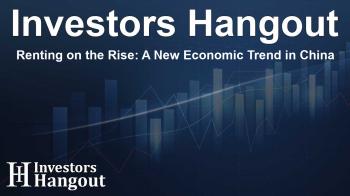Renting on the Rise: A New Economic Trend in China

Changing Consumer Behavior in China
Recently, Chinese media highlighted a shift in consumer behavior, noting an increase in the preference for renting over buying. Cautious buyers are opting to rent a variety of items, including everything from cameras to luxury handbags. This trend is not just a fleeting notion; it reflects deeper changes within China's economic landscape.
Boosting the Economy with Rental Models
The 'rent, not buy' model is becoming a prominent aspect of China's economy. As reported by the official People's Daily, this approach has infused new energy into the market, providing businesses with fresh opportunities. It's a perspective shift as businesses adapt to a landscape where consumers are more hesitant to make outright purchases.
Cost-Effective Rental Options
One notable aspect of this shift involves the affordability of rentals. For instance, consumers can rent high-tech devices such as drones for just 1 yuan a day, a stark contrast to the thousands of yuan needed to purchase one outright. Similarly, luxurious brands now see their items being rented at fraction of their retail value, like a nearly new Louis Vuitton handbag priced at a mere 35 yuan for a rental.
Industry Reacts to Weakened Domestic Demand
The advent of these rental services has emerged largely in response to weakened domestic demand in China. Recent statistics indicate that retail sales grew by a modest 3.5% from January to November, reflecting a cooling in consumer spending as some of the post-pandemic recovery effects diminish. The trend signals an adaptive approach for consumers looking for flexibility, particularly in uncertain economic times.
Incentives for Revitalizing Consumption
In an effort to nudge consumption upward, the Chinese government introduced a trade-in scheme aimed at promoting new purchases through subsidies. This program has reportedly unlocked over 1 trillion yuan in sales by encouraging consumers to trade in old appliances and vehicles for more modern options. However, the tangible impact of this initiative on wider consumption patterns remains to be fully realized.
Balancing Manufacturing and Consumer Demand
This year, China has leaned significantly on its manufacturing and export sectors while household demand has struggled. Years of stagnation in the real estate market have dampened consumer wealth and confidence, prompting economists to call for policies that prioritize consumer spending as a driver of economic growth. Top officials have acknowledged the need for change, emphasizing the importance of boosting consumption and expanding domestic demand.
Future Outlook on Consumption
The People's Daily notes that as China's economy continues to evolve, a clear trend toward consumption upgrading is becoming evident. While this evolution is underway, it remains crucial for both the government and businesses to align their strategies to harness the full potential of this changing consumer landscape.
Frequently Asked Questions
What is causing the shift towards renting in China?
A cautious approach by consumers amid economic uncertainties is driving the preference for renting over buying.
How does renting impact China's economy?
Renting boosts economic activity by providing affordable options, helping to stimulate demand despite cautious consumer spending.
What government initiatives support increased consumption?
China's trade-in scheme provides subsidies to incentivize purchases, enhancing consumer spending and encouraging new consumption methods.
How significant was the retail sales growth this year?
Retail sales grew by only 3.5% from January to November, indicating a slowdown in consumer spending as some post-pandemic effects wore off.
What are the economic implications of a decline in consumer confidence?
Declining consumer confidence can lead to decreased spending, affecting overall economic growth and prompting calls for policies focused on stimulating demand.
About Investors Hangout
Investors Hangout is a leading online stock forum for financial discussion and learning, offering a wide range of free tools and resources. It draws in traders of all levels, who exchange market knowledge, investigate trading tactics, and keep an eye on industry developments in real time. Featuring financial articles, stock message boards, quotes, charts, company profiles, and live news updates. Through cooperative learning and a wealth of informational resources, it helps users from novices creating their first portfolios to experts honing their techniques. Join Investors Hangout today: https://investorshangout.com/
Disclaimer: The content of this article is solely for general informational purposes only; it does not represent legal, financial, or investment advice. Investors Hangout does not offer financial advice; the author is not a licensed financial advisor. Consult a qualified advisor before making any financial or investment decisions based on this article. The author's interpretation of publicly available data shapes the opinions presented here; as a result, they should not be taken as advice to purchase, sell, or hold any securities mentioned or any other investments. The author does not guarantee the accuracy, completeness, or timeliness of any material, providing it "as is." Information and market conditions may change; past performance is not indicative of future outcomes. If any of the material offered here is inaccurate, please contact us for corrections.
